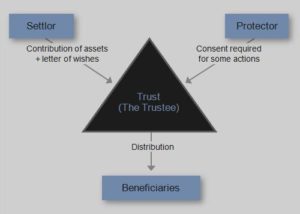How to Avoid Probate in Nevada
The Nevada probate process can be long and expensive. On the short end, a full probate administration currently takes about 12 months in Clark County, Nevada. If there is a will contest, it can take years. And between attorney fees and other expenses of administration, probate can cost $7,000 – $10,000 on the low end to tens of thousands of dollars on the high end.
Because of the time and cost, and the general headache factor, people look for ways to avoid probate. There are certain assets that do not go through probate. They automatically pass to the intended heir. And various methods for avoiding probate.
The following assets, by their nature do not pass through the probate process:
Life Insurance
A Life insurance policy is a contract between the insurance company and the insured. Beneficiaries are listed on the contract. Upon the insured’s death, the insurance proceeds are paid directly to the beneficiary and do not need to go through probate.
Pay on Death Accounts
Brokerage or bank accounts that are payable-on-death (POD) accounts also pay directly to the person named as the beneficiary when the account holder dies. This type of account may also be referred to as an ITF (in-trust-for) account or TOD (transfer-on-death) account.
Joint-Tenancy
Real property held in joint tenancy with rights of survivorship, by operation of law, becomes the property of the surviving joint tenant upon the first joint tenant’s death. This doesn’t really avoid probate, but rather delays it until the survivor’s death.
And jointly owning property with a child is not usually a good idea. If the child’s creditor gets a judgment against the child, the creditor will find his or her name on your property. You don’t want your child’s creditor obtaining a lien on your property.
Another type of joint ownership is as tenants-in-common. However, tenants-in-common does not automatically transfer ownership and probate is necessary for the deceased person’s interest.
Nevada Death Deeds
Real property in Nevada may be transferred on death without probate by using a special kind of “transfer-on-death” deed. This special deed lists a beneficiary much like an insurance policy or POD account and is another way to avoid probate.
Living Trust

Holding assets in revocable living trust is a common estate planning, probate avoidance technique. The Trust is a very flexible tool that allows you, when done properly, to pass your estate upon death to the named beneficiaries pursuant to the terms of the trust.
Simply put, a trust is a legal entity set up by someone known as the grantor (or settlor or trustor), into which assets are placed and held by a trustee. The trustee holds the assets in trust for the designated beneficiaries.
Married couples often set up a joint trust to hold common or community property and assets.
There are also many other estate planning strategies that use different types of trusts that both avoid probate court and reduce estate taxes.
Do Wills Avoid Probate in Nevada?
No! Wills do not avoid the probate process. A common misconception is that probate applies only to those who do not have a will (or trust).
Even though wills name an executor and list beneficiaries, the assets held in the decedent’s name at the time of death must go through probate in order to transfer title.
A valid will gets admitted to probate and becomes the court’s roadmap for directing to whom the assets are distributed. The court ensures the paying of debts and the correct beneficiaries inherit the assets.
Conclusion
Because probate can be expensive and time consuming, avoiding probate court in Nevada when one passes away is often a primary goal. Hiring a good estate planning attorney is the first step.
In order to avoid the headaches of probate, call for an initial consultation.
(702) 894-4110
